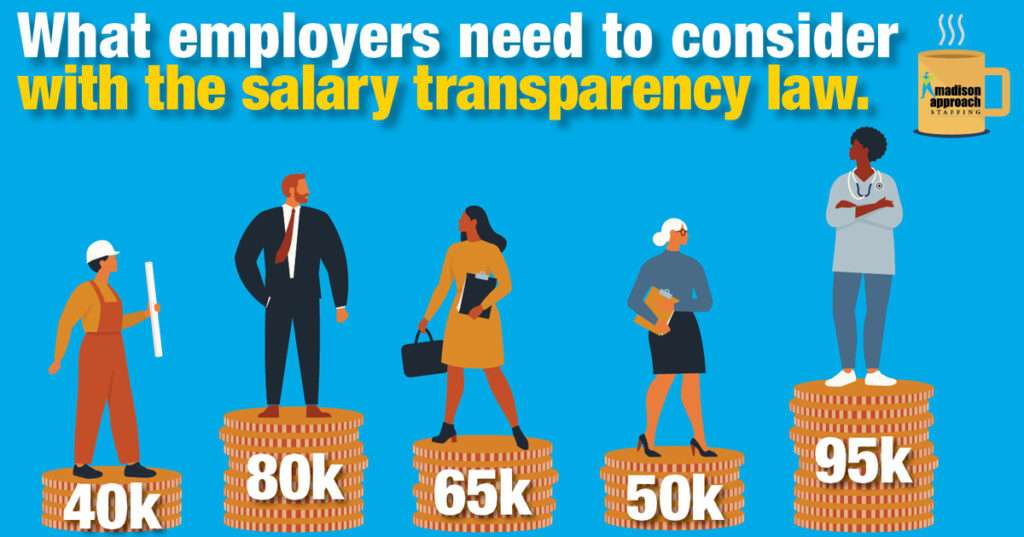
This comes on the heels of a similar law in New York City that took effect on November 1, 2022, with a recently signed New York State law taking effect September 2023. Westchester’s law does not count independent contractors or the business owner toward the threshold and it carves out an exception for family-owned businesses, where at least two-thirds of the employees are the children, parents, spouse, or close relatives of the owner. The law provides for civil penalties up to $125,000, which could be doubled for willful violations.
These new guidelines were drafted to protect employees from discrimination and to close the gender, ethnicity, and disability wage gaps. It sounds fair and simple but what does this all mean to employers?
- Applicants Expecting the Higher Range: Employers worry about applicants automatically expecting the top end of the salary range listed—even if the upper limits are only for the most qualified candidates. Going forward, job postings will need to be more detailed about what education credentials, qualifications, and prior experience warrant the higher range to eliminate confusion.
- Disparity in Current Employee Wages: There is a big risk of alienating current staff due to a disparity in what current employees get paid within the organization—especially between people with the same job title and responsibilities. Employers will need to write very specific job descriptions and outline what qualifies someone for a higher salary and/or promotion—years of service, an advanced degree, specific skillsets, required outcomes on projects, team-building accomplishments, taking on leadership roles, quality and accuracy of work, plus more. The goal is to craft quantifiable performance measures that clearly articulate the rationale for wage differences.
- Current Market Value: As new positions open and salaries become public knowledge, employers may face a reckoning with current employees whose pay scale has not kept pace with current market value. There may be valid reasons they are below the advertised rate, so employers should be prepared to document in writing what is required for an increase in pay or face the fact that annual increases did not keep up with the market, and raise their incumbent worker’s wages.
- Promotion criteria: Employers will need to articulate what the criteria is for each job role and promotions to justify hiring from the outside at a higher pay scale, rather than promoting from within. Policies and documentation are going to be key.
- Making Exceptions for Exceptional Candidates: In some cases, companies may be willing to pay even more than the top salary range for a truly exceptional candidate. If employers want to preserve the option to offer more money to an outstanding applicant, the criteria for which that can happen will need to be very specific about what skills/experience/education would qualify as “exceptional.” Job postings can include language that allows for an exception without violating the new law.
- Productivity metrics will need to be written and be very clear: Every organization will need to outline the exact metrics to measure quality, productivity, and exceptional performance. Create expectation bands; minimum expected vs. exceeding expectations. Make sure to outline what type of outcomes fit into each band. While every employer wants to nurture a culture in which superstar employees can excel and be rewarded, employers will need to hold frequent reviews and document results to head potential disputes off at the pass. Employees will need facts, otherwise moral may suffer.
- Competitor’s compensation: Payroll is the biggest expense of a company and employers want to get the most value for the money they pay to preserve cash and be fiscally responsible, especially if they are a not-for-profit. Employers who are worried about being outbid for top candidates will need to be creative with benefits packages; vacation time, family leave, flex time, and more to compete.
- It’s not just about the money: Companies want workers who are excited about the job, not just the paycheck, so be prepared to communicate the culture and values of an organization in a job posting to attract an employee who is a good fit.
Salary transparency laws will ultimately save time and build trust for all parties during the recruiting and interviewing process, but will also require robust internal systems and procedures to make sure all employees are treated fairly and equitably. It’s a positive step forward for everyone. Lead on!
Contact: Allison Madison at amadison@madisonapproach.com / 914-428-4800
For more detailed information, see the Westchester County Human Rights Commission
